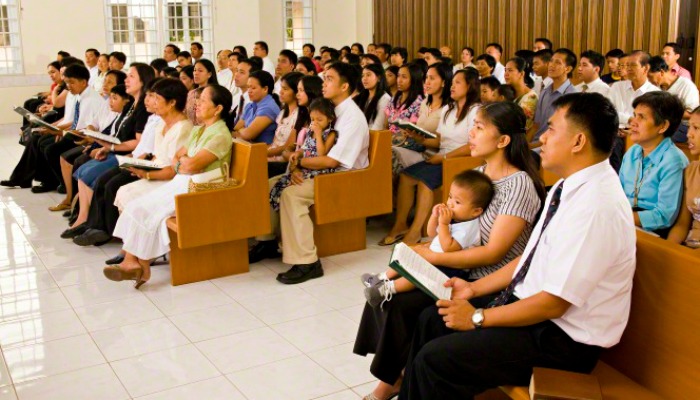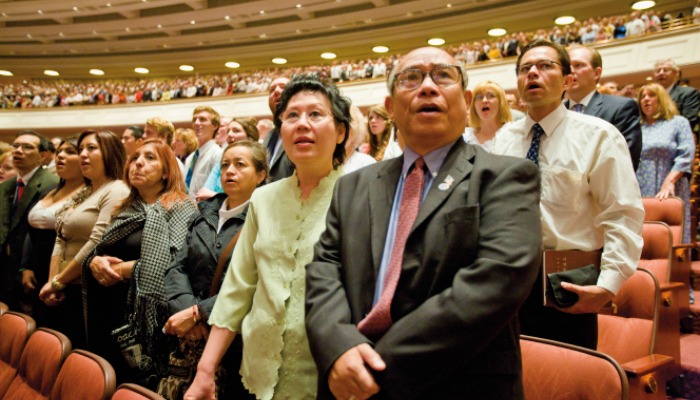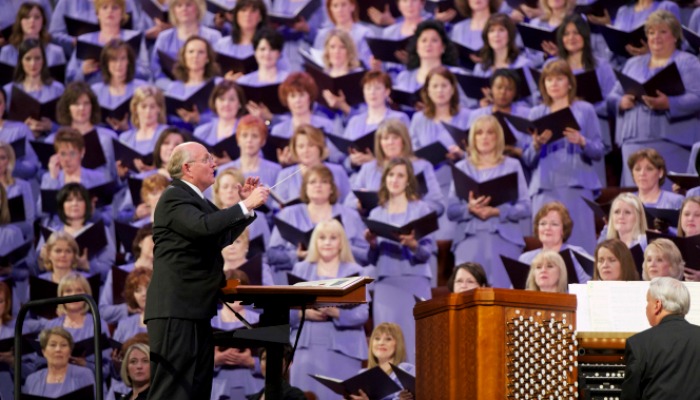The LDS Hymn Challenge
Have you ever thought of how many times you have sung “Sweet Hour of Prayer” or “I Am a Child of God”? What about “High on the Mountain Top” or “We Thank Thee, O God, for a Prophet”?
As members of The Church of Jesus Christ of Latter-day Saints, we sing hymns at the open and close of every church meeting. Typical Sunday church services alone consist of anywhere between 5–8 opening, closing, and rest hymns throughout the three-hour church service. The number of hymns we sing during one week add up if you count Family Home Evening, youth programs, seminary or institute classes, meetings, and devotionals.
No matter how many times we have sung “Redeemer of Israel,” how often do we really listen to and think about the words we sing in hymns every week at church?
In an institute class about LDS Hymns at the Logan Institute of Religion, my teacher encouraged our class to ponder more about each hymn we sing. Rather than worrying about singing on-pitch, letting our minds wander, or taking a two-minute nap during the hymns, we learned how to really feel the Spirit of the hymns.
 Appreciating the Hymns
Appreciating the Hymns
Learning to appreciate the hymns starts with understanding that the hymns are like scripture. More than a simple melody, the hymns contain doctrines and messages that can uplift, inspire, and motivate, just like the scriptures.
According to the First Presidency Preface to the Hymns, “Some of the greatest sermons are preached by the singing of hymns.” Not only do the words testify of Christ, lead us to do better, or comfort our hearts, but the accompanying music deepens the messages.
For example, read “I Believe in Christ,” as though a general authority was speaking the words at conference:
I believe in Christ; he stands supreme!From him I’ll gain my fondest dream;And while I strive through grief and pain,His voice is heard: “Ye shall obtain.”I believe in Christ; so come what may,With him I’ll stand in that great dayWhen on this earth he comes againTo rule among the sons of men.
The power of this particular hymn, written by Elder Bruce R. McConkie, only increases when added to music. Although this sermon would be powerful from the pulpit, the spiritual power from the hymn as a whole changes hearts and testifies of Christ.
Although we may not have adequate words to describe spiritual experiences, hymns have the ability to express feelings that words fail to express on their own.
 Studying the Hymns
Studying the Hymns
President Boyd K. Packer explained, “If we will listen, [the hymns] are teaching the gospel, for the hymns of the Restoration are, in fact, a course in doctrine!”
In our personal study of the gospel, we can study the hymns with their accompanying scripture. When I served my mission, some of my companions and I began companionship study by singing a hymn. Although we never sounded even close to professional, simply singing a hymn invited the Spirit to our study.
When I came home from my mission, I wanted to continue that practice. While I didn’t sing the hymns out loud, I began each personal study by reading through a hymn. Whether I just read the words of the hymn or also studied the accompanying scriptures, they were a perfect way to invite the Spirit and turn my mind from other worries and tasks to gospel study.
Another powerful way to understand the hymns is to learn the history and stories behind them. For example, “Come, Come, Ye Saints” was written by Elder William Clayton, after Brigham Young asked him to write something to comfort and support the murmuring saints in a pioneer camp. After only two hours, Clayton returned with the hymn, which he knew “was written under the power and inspiration of the Lord.” His hymn continues to uplift and inspire saints to this day.
The Converting Power of Hymns
Elder Jay E. Jensen said, “Hymns play an essential role in spirituality, revelation, and conversion. . . . Nourishing hymns create an atmosphere that invites the Spirit, which leads us to conversion.”
The power of good, uplifting music has a significant influence. When we feel the presence of the Spirit in our lives, we feel the need to repent, be more like the Savior, and endure to the end. As the hymns fill us with the Spirit, we will gain spiritual power in our lives that will help us overcome trials, weaknesses, and temptations.
According to President J. Reuben Clark Jr., “We get nearer to the Lord through music than perhaps through any other thing except prayer.”
Many members testify of the converting power of music. Many members can describe a time that a hymn comforted their soul, influenced their decision, or taught them a doctrine. However, if we casually sing the hymns each Sunday and don’t allow their power and influence to change us, we may miss out on opportunities to change and learn from the hymns.
 LDS Hymn Challenge
LDS Hymn Challenge
In order to feel the power of the hymns, we invite you to participate in the LDS Hymn Challenge, originally extended to me by my institute teacher. For one whole week, only listen to LDS hymns found in the Hymnbook. Make sure you pay attention to the words of the hymns you sing throughout the week, and listen to the hymns when you would usually listen to other music.
You can find beautiful renditions of the hymns on the Mormon Tabernacle Choir’s website, or you can find instrumental versions of the hymns. You could also check out the Mormon Music Spotify playlist.
While eliminating other music from our week can be quite a challenge, even one week of focusing on listening only to hymns can bring you more spiritual knowledge and peace. The First Presidency Preface to the Hymns says, “Hymns can lift our spirits, give us courage, and move us to righteous action. They can fill our souls with heavenly thoughts and bring us a spirit of peace.”
Not only will we be blessed individually, but our families will be blessed as we fill our homes with righteous music. “Music has boundless powers for moving families toward greater spirituality and devotion to the gospel. Latter-day Saints should fill their homes with the sound of worthy music” (First Presidency Preface).
Allow yourself to be blessed by the hymns, no matter how you choose to involve them in your life and home. As the hymn “With Songs of Praise” expresses:
The Lord has said a heartfelt songBy righteous ones is prayer;A hymn unites us and invitesThe Spirit to be there.


